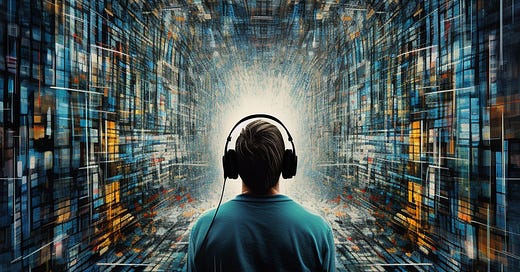I love The National. They’re one of my favourite artists of all time, and about as close as anyone has come to breaking my ‘no act has more than three truly great albums’ hypothesis (yes it’s a real thing, and no you can’t disprove it). Every year The National are in my Spotify Wrapped, regardless of whether or not they’ve released new music; I’ve racked up hundreds of hours of listening time.
Yet, despite my dedication, I had a realisation the other day that outside of the royalties accrued from my decade-long Spotify subscription, I haven’t directly contributed any money to the band whatsoever. I’ve never bought a vinyl or any other item of merchandise, and I’m yet to see them live. Does this make me a bad fan?
Each month via streaming platforms I discover dozens of exciting new artists, that I’d be keen to hear more from, yet so often find myself missing impactful ways of supporting them. Streaming, sharing, liking feels hollow, and contributes little, whereas, being brutally honest, I don’t yet want to commit to a monthly Patreon, buy redundant mp3s or purchase an expensive vinyl. I just want to know that more than half a penny is going towards supporting them in making more music.
And herein lies the elephant in the room of being a modern fan; the vast majority of our digital interactions with our favourite artists are entirely meaningless. Is it even possible to be a good fan, in an era when the value we add to culture is based on how long it captures our attention, as opposed to the passion it instills in us or our enjoyment of it?
Truth be told, I often feel like I’m lacking opportunities to engage in a difference-making way with the artists I love. Toward the end of last year I discovered an artist and album that I adored, and paid a handsome £50 to have a vinyl sent over from the US, half of the cost going on shipping. Surely there must be a worthwhile, universal action in between £0.006 per stream, and dropping £50 on merchandise?
For the past decade we’ve allowed the attention economy built by social media to convince us that streams, likes, pre-saves and follows are meaningful engagements - when in reality they’ve often replaced the actual change-making actions that one could perform to support an artist. It’s astounding how quickly we’ve gone from ‘buy my album’ to ‘watch this TikTok until the end’. These actions that we’ve been convinced are impactful, only move the dial when performed by hundreds of thousands of fans, and with a regularity that releasing music seldom affords. Where these platforms have really pulled the wool over our eyes, is that these actions are meaningful, but for the platform, not the artist.
Asking fans to perform actions that don’t actively benefit anyone is antithetical to the nature of releasing music. Each piece of output is treated as disposable content, and to justify the release of further content, one must ensure that their previous content feeds the algorithm in a manner deemed acceptable. Intentional digital behaviour should have value to it, but condensing these fan behaviours to superfluous interactions, of which an artist needs tens of thousands in order to mean anything creates the most discriminatory and inessential pyramid scheme.
There are no shortage of plucky start-ups promising artists visibility over the data they generate; ‘data is gold’ and all that; all the while charging artists for their service - when in reality it’s not data generation that artists are missing - it’s the ability to turn these data points and interactions into ‘gold’. It’s long been my issue with Spotify for Artists and the similar counterparts - plenty of pretty data points but no tools to do anything with it.
Outside of the top 1% of the artists in the world, most don’t need to analyse every data point to build a cohesive, targeted strategy. Most artists just need the ability to earn from their music and surrounding brand at a quicker and more substantial rate than streaming services currently allow; without inheriting unsustainable overheads.
What’s more, much of the positive fan behaviour that currently exists, happens away from the point of consumption. I’d much rather that meaningful interaction be one I can execute in the moment and immediately; in the same place where my listening happens. It goes without saying that fixing the streaming eco-system goes hand-in-hand with all of this; in particular a clear differentiation in royalty rates between intentional and passive behaviour. At the point my engagement with an artist switches from algorithm driven, to intentional, surely this change in motivation should be reflected in the compensation the artist receives.
Wouldn’t it be wonderful if when clicking the 'heart’ on Spotify, that the artist received some tangible reward for creating a song that moved someone, as opposed to it simply tickling the dreaded algorithm. Now that the industry at large has settled on a model that fixes accessibility issues and entirely lowers the barriers to entry, it’s time for labels and artists to demand a better fan experience to surround the music; one that furnishes purposeful value in both directions.
Being a fan and witnessing the tangible difference your support results in is one of the most rewarding parts of engaging with any cultural output. I can’t help but feel like in our race to have everything, all of the time, we’ve been tricked into losing sight of what being a fan truly means.




